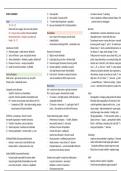WHAT IS BUSINESS 1) Gain expertise - Cut taxes on income ↑ spending
2) Raise capital + increase profits - Taxes on products to influence demand (cheap = EVs
Costs 3) ↑ market share (Expansion) + reputation - ↓ interest rates (cut mortgages)
- TC = FC + VC 4) Buy out shareholders (PLC to ltd) privatisation
- Fixed costs (rent, wages), Semi vary costs (phone) Economic
- VC = cost per unit x quantity sold (raw materials) Shareholders - Administration = insolvent, administrator runs ops
- Revenue (turnover) = unit price x quantity sold - Own a share of the company, provide funds - Disposable income = money left after taxes
- Profit = TR – TC - Limited liability - Discretionary income = money after taxes + necessiti
- Annual General Meeting (AGM) – shareholders vote - Economy growth, wages ↑, price ↑ to maintain profi
Importance of profits - Rising income, ↑ luxury, essential demand same, rec
1) Motivate people – profit sharing + dividends Reasons for investment for demand, ↑ wages, stock shortage ↑ price
2) Source of finance – grow, not pay back interest 1) Right to receive dividends - Falling income in recession, excess stock sold ↓ price
3) Attract stakeholders – dividends, suppliers, skilled staff 2) Capital gain (buy price low + sell when high) profits, cheap alternatives, cost saving (training, dela
4) Measure of success – compare competitors 3) Financial support to business (survival, growth) - Interest rates = bank of E, cost of borrow, saving retu
5) Guide for internal investment – profitable 4) Venture capitalists = potential to succeed - Low = ↓ FC, ↓ unit cost, ↑ profit, ↑ comp, expand,
risk, large financial reward, limited liability demand as saving less attractive, loan repayments ↓
Forms of business 5) Gain control / involved in running the business discretionary, cheaper to purchase on credit, ↑ inve
Public sector = gov owned, services, tax, not profit vote on resolutions at AGM, inspect records - High rates = FC on LT loans ↑, ↑ unit cost, ↓ profit m
Private sector = individually owned ↓ competitiveness, ↑ interest on savings, ↓ disposa
Share prices as save, ↓ demand, borrow expensive, produce chea
Companies run by directors Ltd = control over share price as private investment
- Small ltd = directors are shareholders PLC = price by supply + demand (stock market) Social
- Large ltd = directors elected by shareholder board > LT investors = not highly impact, profits fluctuate so - Demographics = changing, adapt product for demand
- Plc = owners not necessarily control (divorce of O+C) changeable dividends - Ethnically diverse population (15% not born in UK), ↑
> Companies act 2006 – docs before trading, produce > ST investors = share price ↑, capital gain if sold / if cultural ingredients, migrant work for less, ↓ costs
annual reports of financial activities prices ↓ they make loss or hold on till increases - Labour supply – high unemployment = good supply, h
easily low wages, low unemploy = training costs
Profit firm = go bankrupt + close if no profit Factors influencing supply + demand - UK aging population – ↑ retire accounts, doctors, ↓
Non-profit organisations = benefit community - Performance of company – ↑ profits, dividends labour turnover, ↑ wages, ↓ productivity if elderly i
1) Charities = donations + get tax reductions - New product launches ↑ share price - Ethical – child labour, sweatshop, fair trade USP, ↑ c
2) Social enterprises = beneficial social activities - Sell shares if rumour of liquidation - Gain good reputation = ↑ demand
3) Mutual organisations = reinvest profits, ↓ price - Current share price = capital gain
- Interest rates (financial > interest in bank) Technology
Unlimited liability (unincorporated business) - Strong economy = confident get good return - Improves cheap marketing + targeting so ↑ demand
- Business + owner seen as one identity by law - Weak economy = more shares to ↑ demand - Gather information to help target right audience
- Business debts = sell personal assets, risky - Proposed takeovers – current shareholder offered to - ↑ production efficiency (reduce long term costs)
buy shares from takeover business - Ethical issue, less jobs available = negative image
Limited liability (incorporated business)
- Not personally responsible for business debts Ordinary share capital = money from selling shares Legal
- Separate legal identity (shareholders know risk) - Long term investment – permanent - Business enforces controls + legislation
- Lose money invested – insolvency + liquidation - Dividends = return for investment - Fined if not meet pollution targets (cheaper?)
- Fixed amount per share




